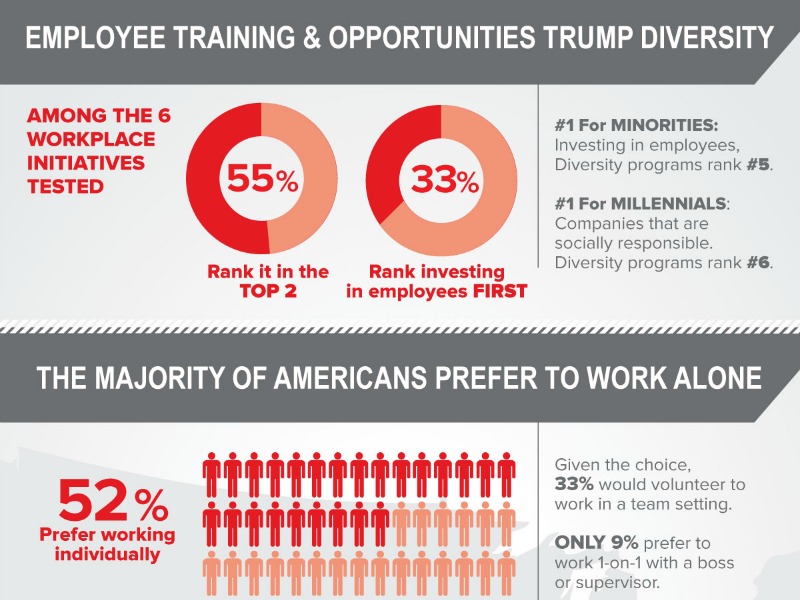Holmes Report 31 Jan 2016 // 7:48PM GMT

Americans believe the most important employee initiatives involve investing in employees through training and growth opportunities, according to Finn Futures, the first in a new and ongoing series of survey from Finn Partners and its polling and research division. Respondents ranked diversity and inclusion programs last in importance.
This view of employee enrichment programs extended to minorities: for non-white Americans, investing in employees, providing flexible work environments and recruitment rose to the top in terms of importance, while diversity programs ranked near the bottom of the list provided. The only group of Americans with a significantly different view of enrichment programs was millennials, who ranked social responsibility above training, recruiting and all other initiatives.
In addition, despite the current trend toward collaborative workstyles, the survey found that more than half of Americans would prefer to work individually. Only a third favored collaboration.
"This desire to work individually could be a result of a natural tension between poorly integrated collaborative efforts in American business and a genuine, individual desire to advance professionally," says Dan Leidl, director of organizational development and human capital at PRG and author of "Team Turnarounds: a Playbook for Transforming Underperforming Teams."
"Ambiguity at the decision making level and a lack of explicitly shared goals can result in distrust in collaborative environments. Transparency and clarity are the keys to getting the most out of collaborative work styles; being even more explicit about how shared efforts can lead to individual gains may help groups overcome collaborative frustrations."
Finn Partners director of research Christopher Lawrence adds: "The lower ranking of diversity programs seems to fly in the face of what we believe to know about the value of diversity to businesses' bottom lines. But the fact that this ranking is consistent across all demographic groups may indicate that these programs themselves are not seen as immediately beneficial to individual workers who are hyper-focused on career growth and trajectory. They place greater value on training and investment—color-blind programs that benefit all employees, regardless of gender, age or race.”
The survey also found that millennials may be less invested in their industry or company: 43 percent of American workers plan to spend more than 10 years within their current industry; 69 percent plan to spend six years or more; but on average younger Americans believe that they will spend no more than seven years working in their current industry and no more than six years with their current company.


































.jpg)

















